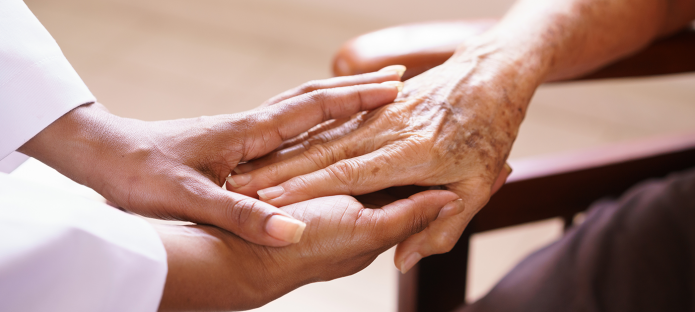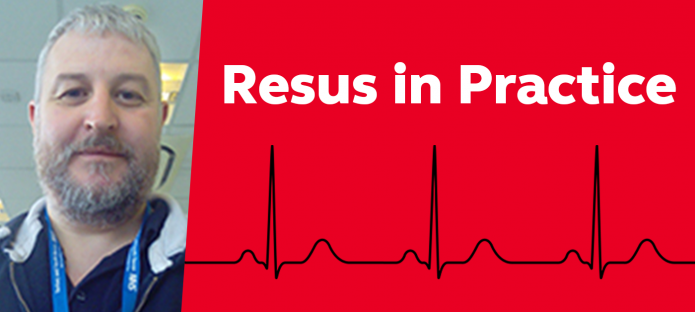Angela Wall is a Community Matron working in Coventry and Warwickshire Partnership NHS Trust (a job title that will soon be changing to Advanced Nurse Practitioner as part of the New Ways of Working and supporting the Local Out of Hospital Model), where a large part of her role involves the ReSPECT process.
Her responsibilities are many, and her days are varied - but no matter what, she always faces each day with a determination to put her patients first.
Angela has been working in the community for over 25 years and as a Community Matron for the last 14 years. Her role is to support patients who have long term conditions and their families and, if appropriate, find ways to reduce the risk of avoidable hospital admissions. For this, she needs to be proactive, promote self-management, and work with the agencies and teams who are coordinating their care.
Her career history is varied. Angela was a District Sister for many years, a role which provided valuable experience for moving into her role as a Community Matron. As an Advanced Nurse Practitioner and Independent Prescriber, she was able to work in a more autonomous way, supporting, leading and providing holistic patient care. She has never lost her passion for supporting patients in the terminal stages of life and is now able to support patients as their long-term condition deteriorates and, if appropriate, to support them so that they can die at home.
Angela’s days are split between planned visits and more urgent visits, as patients may make contact unexpectedly due to health deterioration and require same-day help. In her role, she may also be supporting patients who have health, social, or mental health conditions, as invariably they are all entwined. It is important that the patient and their family can have direct access to Angela so that they can contact her for advice and, if their health is deteriorating, she can promptly arrange to review them at home. She works very closely with the GPs and multi-disciplinary teams (MDTs) to ensure the appropriate services are involved.
Now, Angela’s time is spent both in direct contact with patients as well as in non-clinical work. Angela is leading on training for the implementation of the ReSPECT process in Coventry. She also attends meetings in the community which benefit from Matron input.
“I have to juggle several demands – but all the time my priority is providing direct patient care,” she says. “Hence, I don’t have a typical day, which can make my role challenging and exciting- and I often reflect on how I continue to learn something new every day.”
ReSPECT is the perfect project for Angela’s line of work, as it is intertwined in what she does in many ways. The process enables her to be proactive in supporting patients with long term conditions and, if appropriate, in providing the patient with the opportunity to discuss future care in a planned, sensitive manner. The process also gives the patient the opportunity to make choices which can avoid unnecessary hospital admissions and give their family the confidence and guidance of what to do in an emergency situation.
Angela finds that the ReSPECT process being nationally driven helps promote cohesive and seamless care - as the documentation stays with the patient, teams from acute and community settings have a unified approach. By sharing information and conversations, it helps prevent patients having to repeat themselves. Many systems help to make her workplace a good one - Coventry and Warwickshire are using the CASTLE Register (The Electronic Palliative Care Coordination System [EPaCCS] for Coventry and Warwickshire), an electronic system to record information about a patient (someone in palliative care who may have an ACP, ReSPECT form, et al.) This can be used by GPs, paramedics, acute care, community teams, hospices, and any others who encounter the patient. This helps greatly to communicate the decisions and plans made - especially when it comes to supporting the paramedic response to patients, ensuring that the patient’s wishes are recorded whilst providing paramedics with the information to make a decision in the patient’s best interest.
These systems are incredibly useful in the role of a Matron, but Angela has also had to be proactive in her own learning. Due to the nature of her caseload, Angela has developed skills in assessing and referring patients with cognitive impairment; she may then lead on arranging best interest meetings for those patients who lack capacity and their family, to make appropriate decisions and plans around their end of live and emergency care decisions.
There are, of course, challenges in Angela’s role. The patients that she sees tend to be of an ageing population. As patients are living longer, with complex co-morbidities, and the demand upon the NHS is getting greater, this is reflected in the challenges of supporting patients to live safely at home. This is an area where working with ReSPECT is useful. According to Angela, “If approached in a timely and supportive manner, ACP/ReSPECT is a positive experience for the patients and family.” Angela is also mindful that while she is coordinating and supporting the patients and family, she has to ensure that they do not form a dependency on her, as she needs to be able to transfer patients onto other services to ensure they get the best care for their needs.
The work that Angela does is important and valued by both patients and families - and it’s this that gives Angela her greatest satisfaction in her role. The dedicated and compassionate Matron prides herself on being able to reassure and support her patients and their families. Often, when assessing the concerns of the patient, she finds the patient is grateful and appreciative just to be listened to.

